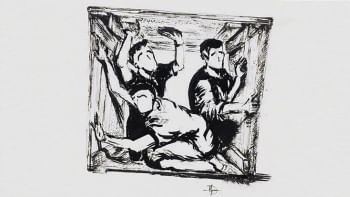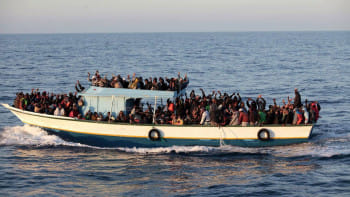Don’t let human traffickers off the hook

It's alarming that despite having a specialised legal infrastructure to prosecute human trafficking cases, Bangladesh has been registering appallingly low conviction rates. As per data from the Anti-Human Trafficking Offence Tribunal in Dhaka, only around 1.5 percent of cases that it dealt with have resulted in convictions, meaning an overwhelming majority of accused criminals have been let off the hook. Reportedly, the Dhaka tribunal disposed of around 858 cases from March 2020 to August 2022. Of them, only 13 resulted in convictions, with 20 accused handed different jail terms.
There is a bureaucratic vibe about how the government has been approaching this issue. It has ticked boxes that improved its standing in the US Trafficking in Persons (TIP) reports but brought little else in terms of actual improvements.
This is from just one special tribunal, however. Bangladesh has seven such tribunals tied with seven divisional cities which, according to the home ministry, have a combined total of around 5,781 cases still pending as of June. Although all 64 districts in the country are supposed to have a tribunal of their own, the fact that even the most visible of existing tribunals hasn't had any visible effect is quite telling. It demonstrates the futility of existing legal interventions in curtailing human trafficking, but also the perfunctory manner in which the seven tribunals were formed in 2020 – amid a then-looming threat of US sanctions – although it was a major provision of the Prevention and Suppression of Human Trafficking Act passed eight years earlier.
There is a very bureaucratic vibe about how the government has been approaching this issue. It has ticked boxes that improved its standing in the US Trafficking in Persons (TIP) reports but brought little else in terms of actual improvements. After the release of the latest TIP report on July 19, 2022, US Secretary of State Antony Blinken recognised Bangladesh's efforts but cautioned that the country is yet to fully meet the "minimum" standards for the elimination of trafficking. It is the second part of his observation that worries us.
The problems in the legal fight against trafficking are legion. For example, the general focus still seems to be more on disposal of cases than reaching convictions – the appearance of efforts rather than meaningful efforts. Although state officials like to attribute lack of convictions to the non-cooperation of victims, a report by The Daily Star shows the reasons are more diverse. It identified a combination of factors including absence of proper evidence in charge sheets, non-appearance of witnesses, out-of-court settlements, threats from the accused, and lack of expertise in dealing with the cases. One can assume that if state prosecutors and investigators performed their duties properly and with sincerity, a lot of the trials would have gone in a different direction.
Overall, Bangladesh is taking baby steps when it should be taking giant strides given the complicated nature of these transnational crimes. There is no denying the importance of convictions in preventing them. It can send a powerful message that no one guilty of committing or abetting trafficking can get away without punishment. We urge the government to make more meaningful and sustained efforts, including removing systemic loopholes in the legal and administrative processes, so that no one can exploit laborers seeking to work overseas.

 For all latest news, follow The Daily Star's Google News channel.
For all latest news, follow The Daily Star's Google News channel. 







Comments